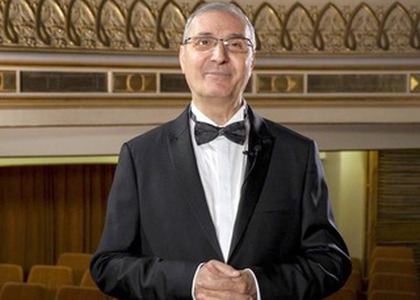> [Archived] Interviews

Interview with Marin Cazacu, the manager of the “George Enescu” Philharmonic from Bucharest
On Monday, the 15th of January, from 7:00 pm, an amazing concert is being performed at the Romanian Athenaeum, celebrating the National Culture Day. The event organized by the "George Enescu" Philharmonic brings Romanian music to public attention - we find out more details from the manager of the philharmonic, Marin Cazacu.
How did you come up with Monday's artistic program?
On Monday, we had the pleasure of creating something new for the "George Enescu" Philharmonic, because, seeing that it was a special day, the National Culture Day, there are important events being held, such as the one at the National Opera - the Oedipe opera by George Enescu. In order to avoid cannibalizing our events, we thought of making our own event of such magnitude at the Romanian Athenaeum, so we took a rather educational approach. An educational concert, "Music for everyone", with Romanian music. Actually, the most beautiful Romanian music there is. We have selected musical pieces for multiple instruments, even for voices, which will be performed by the musicians from "George Enescu" Philharmonic Orchestra and Choir. And, this way, the National Culture Day simply "blossoms", because we're passing on to future generations what culture means to us, what quality music means to us, the heritage we have and want to pass on to posterity.
So, did you intend it to be Bucharest-based?
Not necessarily. These certainly aren't the only events held at the Athenaeum, and by these I mean the concert I was referring to earlier. From 2:00 p.m. we are organizing hourly guided tours for those who want to visit the Romanian Athenaeum, with a guide who will present the most important aspects about the building of the Romanian Athenaeum and about the "George Enescu" Philharmonic, tours that a lot of people have signed up for, coming from outside of Bucharest as well. But the number of seats is limited, there are only 800 in the hall. This had to be done, because we couldn't afford having the limit above the hall's actual capacity.
I've also heard that the tickets were free.
Indeed. Actually, all the events taking place on the 15th of January, from all the cultural institutions under the Ministry of Culture, I suppose, are free for all those who want to visit the museums or the building of the Romanian Athenaeum or those who go to concert halls, theatre or musical shows.
The National Culture Day may be a good opportunity to draw conclusions for last year or to make assumptions for next year. In what way do you see it?
We're going to draw our conclusions after this event, for sure. We set out to attract as many people as possible closer to the cultural institutions. And not only closer, but actually within these buildings and to have them get better acquainted with the Romanian culture that we must, first of all, learn to claim as our own. Someone once said that you can't build your future without knowing your past. This is why it's very important that we pass on what we have… I think this is why this concept that we've come up with for the National Culture Day is something we should carry on for all the days of national importance, such as the National Day of Romania, the Romanian Unification Day. In fact, there were so many people signed up for the concert on the 15th that we could not accept them all because of the limited capacity of the hall. So we rescheduled them for the 24th of January when we will have another special moment - the History Lesson at the Romanian Athenaeum.
Can you tell us more about that event?
There will be a recital as well and guided tours which will be presented by a historian this time, seeing that there are a lot of important things to be talked about. As a matter of fact, there is a sequence with Alexandru Ioan Cuza, the ruler of the Unification of 1859, even on the Romanian Athenaeum fresco. And this must be also linked to the music of the Unification, because, as you know, there were a lot of extremely important pieces composed - "Hora Unirii" and many others - that we sing to this day. We must learn what an echo and impact they had at that time… It unites us to this day - which is what music should actually do.
Since it's an educational concert, I think it would be good if we talked a little bit about the level of musical education of the Romanian audience.
We don't know the background of the people coming in. We start from there. There are people signing up - some for the first time, others for the second or the third time. I set up this project, "Music for everyone", a year and a half ago, when I became manager of the "George Enescu" Philharmonic and I've seen it grow. The project is intended for that type of audience who doesn't attend symphonic concerts on a regular basis or our concerts from Thursdays and Fridays and who first gathers information, some basic knowledge, a few important things about how to behave in a concert hall and, after that, we see them actually coming in and buying tickets for our symphonic concerts.
So it's a project that truly generates attraction for music, which is very important, and attraction for a cultural event. People also start associating themselves with such important things that give them this amazing spiritual satisfaction.
Translated by Raluca Daniela Miloș,
University of Bucharest, Faculty of Foreign Languages and Literatures, MTTLC, year II
Corrected by Silvia Petrescu














